|
International Perspectives - November 29, 1999
Anne D. Picker
International Economist, Econoday
World Trade and Soaring Markets - Are they related?
The World Trade Organization begins its meeting in Seattle on Tuesday with an undetermined agenda. The meeting has attracted demonstrators from virtually every imaginable group with a cause. However, in spite of the fractiousness both inside and outside the meetings, it is apparent that the financial markets are benefiting from worldwide growth - nascent and long standing. And many participating countries have pulled themselves out of recession on free trade's coattails.
Financial Markets
Equity trading was interrupted last week by Tuesday's holiday in Japan, and Thanksgiving and attendant short trading sessions in the United States on Wednesday, Thursday and Friday. Still, many indexes managed to hit new highs for the year including the Nikkei, Hang Seng and Singapore in Asia, the FTSE and CAC in Europe, and the Canadian Toronto Stock Exchange 300 composite index and Mexican Bolsa in the Americas. In Europe, stock markets saw their benchmark equity indexes soar to levels never reached before. Merger and takeover fever in the telecommunications, banking and media drove the markets' enthusiasms and averages upward!
| Selected World Stock Market Indexes |
| Index | 19-Nov | 1999
High | 1999
Low | Week %
Change |
|---|
| Asia |
| Australia | All Ordinaries | 3060.00 | 3145.20 | 2804.80 | -0.54 |
| Japan | Nikkei 225 | 18914.50 | 18914.50 | 13232.70 | 1.85 |
| Hong Kong | Hang Seng | 15284.53 | 15284.53 | 9076.33 | 1.40 |
| S. Korea | Korea Composite | 949.16 | 1027.93 | 498.42 | -4.43 |
| Singapore | Straits Times | 2235.82 | 2235.82 | 1286.56 | 0.67 |
| Europe |
| Britain | FTSE 100 | 6684.80 | 6684.80 | 5770.20 | 3.12 |
| France | CAC |
5396.99 | 5396.99 | 3958.70 | 2.54 |
| Germany | XETRA DAX | 5958.07 | 5958.07 | 4668.50 | 0.04 |
| North America |
| United States | Dow | 10988.91 | 11209.80 | 9120.70 | -0.14 |
| Canada | TSE Composite 300 | 7890.00 | 7890.00 | 6180.30 | 2.56 |
| Mexico | Bolsa |
6337.45 | 6337.45 | 3300.42 | 0.81 |
Asia
The Nikkei surged above 19,000 for the first time since August 1997 last week. However, it ended the week below that magic number at 18,914. Securities' stocks and expected reforms in the banking sector bolstered equities. The Nikkei has risen about 40 percent since January first. With foreign investors needing yen to satiate their appetites for Japanese stocks, the Nikkei is keeping the yen strong. Foreigners have been net buyers of Japanese equities for 40 of the last 43 weeks, according to figures from the Tokyo Stock Exchange.
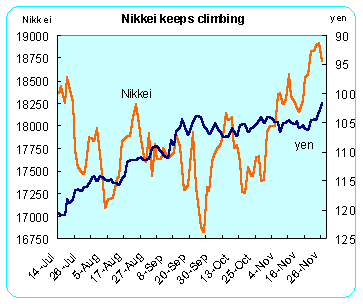
Europe
FTSE - Worries about a possible increase in British interest rates were calmed by news that third quarter gross domestic product growth remained at 0.9 per cent and 1.8 per cent when compared with last year. The markets reacted to Britain's strong economic outlook and the likelihood of higher UK interest rates. At one point, the index broke through the 6700 mark for the first time. Although UK shares have been on something of a roller coaster ride during the past two years, the FTSE has been climbing steadily over the past few weeks. Despite several sharp dips, the long term trend continues upward, with the index having gained about 14 percent this year.
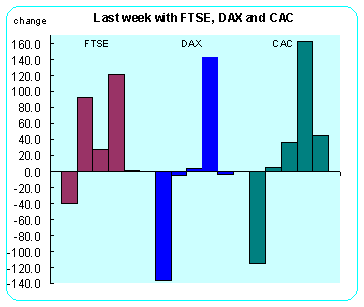
DAX- The German DAX was very volatile because of the potential hostile takeover of the telecommunications group Mannesmann by Vodafone AirTouch. In addition, the fate of insolvent construction company, Holzmann roiled market participants. While the status of the merger continues to attract the market's attention, German Chancellor Gerhard Schroeder has resolved the Holzmann matter. This government interference also unsettled the market because it reflected the "old" way of doing things. Despite this, the DAX managed to hold its own last week, closing at 5958.
CAC - The French CAC, led by strong telecommunications and technology shares, surged upward. The index reached another new high at 5,397 by week's end.
Currencies
Euro
The euro plunged to new lifetime lows against the yen, dollar and pound sterling on Friday. There were few new specific reasons for the euro's decline, but analysts pointed to fears over the slow restructuring in the Euroland economies. They also point to the better performance of United States and Japan assets in recent months when compared to those in Euroland. The euro almost slipped to parity with the dollar, touching $1.0076 before stabilizing at about $1.01.
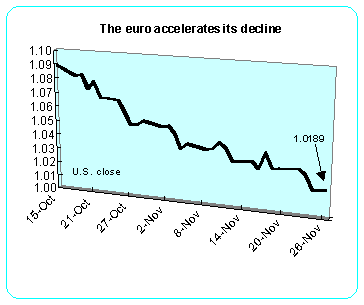
The euro fell to its weakest level against the dollar, the yen and the British pound sterling after the European Central Bank suggested it wouldn't buy the single currency to try and bolster its value. Investors shunned euros on concern that France and Germany aren't willing to push through the reforms that the ECB has said are essential to foster growth. That was after France rejected Coca-Cola Co.'s bid for Pernod Ricard SA's Orangina soda and German Chancellor Gerhard Schroeder criticized Vodafone AirTouch Plc's hostile bid for Germany's Mannesmann AG and used taxpayers' money to help save a German builder.
The euro was introduced at nearly $1.18 on January fourth amid buoyant enthusiasm about new opportunities in Europe's unified market. The euro's decline provided another reminder of Europe's nagging economic problems and its inability to match the relentless growth of the United States. The euro also hit record lows against the British pound, which is certain to aggravate the new wave of hostility within Britain about joining the European currency union. The euro's most drastic decline has been against the Japanese yen, which has climbed sharply against all major currencies.
Yen
The yen recorded its biggest gain against the dollar in two weeks after a report signaled Japan's economy probably expanded in the third quarter. Heightened growth expectations have enticed overseas investors into Japanese stocks in recent months, intensifying demand for yen. The yen was also helped by Japanese exporters repatriating funds into yen ahead of an end of December accounting deadline.
The Bank of Japan intervened in the currency market ten times in the four months through September in a vain effort to reduce the yen's value. The yen is the world's best performing major currency against the dollar and the euro this year, up about 9 percent and 23 percent, respectively. Japanese central bankers and investors may be even more worried about the euro/yen than the dollar/yen. The extraordinary surge of the yen against the euro threatens to strangle Japanese exports to Europe because Japanese goods cost more in European currencies.
World Trade Organization...
When the World Trade Organization (WTO) meets in Seattle on Tuesday, it will be celebrating more than 50 years of breaking down trade barriers between countries all over the world. The Geneva based organization - successor to the General Agreement on Tariffs and Trade (GATT) - promotes free trade by persuading countries to abolish import tariffs and other barriers. Formally organized in 1995, WTO membership has mushroomed to 134 countries with 30 more nations, including China, waiting to join.
With the Second World War just ended, countries met in Geneva to try to give a boost to trade liberalization. Twenty-three countries decided to negotiate to reduce customs tariffs. On October 30, 1947, they signed the General Agreement on Tariffs and Trade. Since 1950, world trade has grown 14 times to more than $6,500 billion in 1997. In the same period the proportion of world economic output attributed to trade has increased from eight percent to 26 percent.
The WTO is the only international agency overseeing the rules of international trade. Its charter is to help trade to flow smoothly, settle trade disputes between governments, and organize trade negotiations. The main difference between the WTO and the GATT is that GATT was a provisional legal agreement, whereas the WTO is an organization with permanent agreements. Perhaps the most well known, most ambitious and far-reaching trade round so far occurred between 1986 and 1993, and was called the Uruguay Round. The tariff reductions that were agreed to during these talks continue to be implemented.
The preparations for Tuesday's Seattle meeting has been characterized by continued fractious squabbling and blatant attempts at protectionism among the 134 member countries, notably on behalf of French and Japanese farmers.
Seattle Summit
The Seattle summit is supposed to launch the first global trade negotiations since the marathon eight-year Uruguay round ended in 1994. The talks - named the millennium round - are expected to last three years. But a last ditch effort to establish an agenda failed and leaders other than President Clinton are shunning the meetings. Although the United States and Canada have reached bilateral agreements with China, there is still no agreement over China's entry into the WTO - even though all sides pledged their commitment to overcoming the remaining hurdles.
Some see the WTO as a toy of the United States and the European Union. The World Trade Organization is the policeman of global trade. Its decisions are absolute and every member must abide by its rulings. So, when the United States and the European Union are in dispute over bananas or beef, it is the WTO that acts as judge and jury.
The United States and the Europeans want the trade group to help resolve global disputes on labor and the environment that even a few years ago were considered beyond the purview of its small, specialized bureaucracy. The push for expanding the Geneva-based trade group's mandate has divided the developed and less developed countries and has further complicated the picture.
The WTO makes decisions on a basis of unanimity. No country can wield a power of veto. The members pledge to follow certain principles. They are - extending trade concessions equally to all WTO members; aiming for a freer global trade with lower tariffs everywhere; making trade more predictable through the use of rules; and bringing about more competition by cutting subsidies. Given the large number of members these are never straightforward affairs and considerable brinkmanship involved. The talks also will test support for freer trade in both rich and poor countries, especially since delegates will face a major protest campaign meant to mobilize worldwide opposition to new trade efforts.
But other rounds of trade talks have begun amid heavy politicking and have ended up producing broad accords that free up trade. In the WTO's short existence, it has concluded landmark agreements to liberalize telecommunications and financial services markets. And it has emerged as the major forum for formulating and enforcing global rules. All the countries at the meeting this week will be looking for competitive advantage for their economies.
Indicator scoreboard...
Europe
Britain
Third quarter gross domestic product was unrevised at an increase of 0.9 percent on the quarter and 1.8 percent when compared with last year. The economy is growing at its fastest rate for two years and at an annualized rate of nearly four percent. This is well above its long term trend rate of 2.25 percent. Upward revisions to production output were offset by downward revisions to service industries. The Bank of England's Monetary Policy Committee closely watches these data when deciding on the appropriate interest rate level.
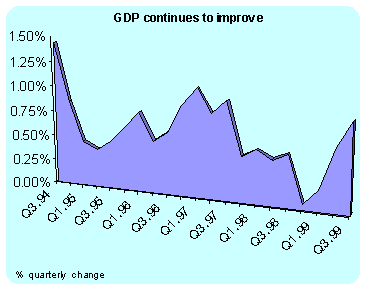
October's trade deficit with countries outside the European Union rose to a record $3.4billion. The figure was a sharp rise on September's trade results. The reason was the huge trade gap with the United States.
France
September manufacturing output dipped 0.1. The decline resulted from contrasting trends. Gains in the auto industry (+3.5 percent) and in the capital goods sector (+0.1 percent) were more than offset by declines in consumer goods (-1.3 percent) and the semi-finished goods (-0.6 percent).
Gross domestic product grew one percent in the third quarter, after an upwardly revised 0.8 percent in the second quarter according to preliminary seasonally and workday adjusted data. Largely unexpected, however, was an inventory decline, which trimmed third quarter growth by 0.5 percentage point.
Germany
October producer prices rose 0.2 percent on both the month and the year. The October year over year gain is the first since May 1998. The relatively small producer price rise shows German price pressures remain subdued. As in previous months, higher oil prices accounted for a good share of the increase.
Italy
September unadjusted retail sales jumped an unadjusted 2.8 percent over September a year ago. The increase is due primarily to stronger sales in large stores, in particular non-food sales of computers, electrical appliances, furniture and beauty products.
EU
The European Union's economy will grow three percent next year, up from 2.1 percent in 1999, the European Commission forecast today. The commission predicted EU unemployment falling from a 1999 level of 9.2 percent to 8.6 percent next year and 8 percent in 2001. Inflation is expected to remain well below two percent, despite the adverse effects of high oil prices.
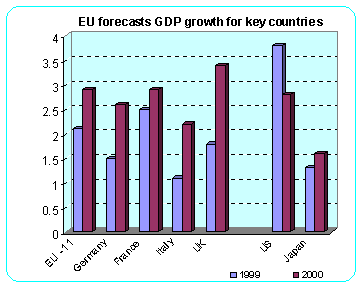
September workday adjusted industrial production rose 0.8 percent on the year. The growth was extremely divergent among countries. While quite a few nations reported strong increases in the month, declines in Germany and Italy held down the overall result. Germany's reported one percent annual decline especially held down industrial production in Euroland.
Asia
Hong Kong
September retail sales in Hong Kong fell six percent when compared with a year earlier. After discounting the effect of price changes over the period, the volume of retail sales increased by an annual three percent. Total retail sales decreased by three percent in volume compared with a year earlier for the first nine months of 1999 as a whole.
Third quarter gross domestic product grew by a real 4.5 percent. It was the city's second straight quarter of economic expansion. Hong Kong's economy grew by 0.7 percent in the second quarter, ending a year long recession.
South Korea
Third quarter gross domestic product expanded three percent, fueled by rising exports and paving the way for the economy's best year in a decade. Gross domestic product expanded 12.3 percent when compared with a year earlier and faster than the 9.8 percent expansion in the second quarter, against the previous year.
October unadjusted unemployment rate fell to a 21 month low of 4.6 percent. Hiring rose last month at wholesale and retail stores, restaurants and lodging establishments, as well as at construction and manufacturing companies. The unadjusted jobless rate in October was the lowest since January 1998 when it stood at 4.5 percent. The unadjusted jobless rate was 4.8 percent in September.
Japan
October trade surplus fell 14.4 percent from a year earlier, as rising oil prices boosted import values and exports remained resilient in the face of the strong yen. The nation's trade surplus with the U.S. narrowed for the first time in six months, shrinking 13.9 percent from a year earlier. The combination of higher oil prices and the strong yen helped to ease the decline in the value of imports and extend the streak of declines in export values.
October retail sales fell 0.2 percent on the year improving from the 1.8 percent fall in September. Wholesale sales fell 6.8 percent on year while combined overall sales fell 5.3 percent on the year. Large scale retailers reported sales were up 3.2 percent, although when store openings and closing were taken into account they were down 0.8 percent.
Americas
Canada
October industrial product prices edged up 0.1 percent as widespread growth across commodities was nearly offset by weaker lumber prices. If the exchange rate had remained unchanged from September to October, the index would have declined 0.1 percent rather than growing 0.1 percent.
Raw material prices fell 1.1 percent as lower prices for crude oil, grains, most base metals and oilseeds were partly offset by higher prices for gold, nickel, cattle, hogs and fish. Compared with 12 months earlier, raw material prices in October were up 15.8 percent. Higher prices for crude oil, animal products, non-ferrous metals and wood were partly offset by lower prices for vegetable products and ferrous materials.
Why U.S. investors should care...
The importance of trade to the financial markets cannot be disputed. Trade has enhanced economic lives of countries worldwide. It has provided investment opportunities that might not have otherwise existed for the international investor. Market participants watch the trade numbers as an important economic indicator for growth opportunities abroad.
Looking Ahead
|
Central Bank Activities |
| Dec 1 | Japan | Bank of Japan Monetary Policy Committee |
| | minutes released from October 27th meeting |
| Dec 2 | EMU | European Central Bank Governing Council Meeting |
| Nov 29 | Japan | Bank of England auctions off government gold |
|
The following indicators will be released this week... |
| Europe | | |
| Nov 29 | UK | Consumer Credit (October) |
| Nov 30 | EU | Final Trade Balance (August) |
| | Preliminary Trade Balance (September) |
| France | ILO Unemployment (October) |
| Dec 1 | UK | PMI manufacturing survey (November) |
| | CBI Distributive Trades Survey (October) |
| EU | Reuters PMI (October) |
| Italy | Reuters/ADACI PMI (October) |
| France | CDAF-Reuters PMI Index (November) |
| Germany | BME/Reuters PMI (November) |
| Dec 2 | UK | Halifax House Price Index (November) |
| Germany | Wholesale Sales (October) |
| Dec 3 | Italy | Industrial Orders (September) |
| Asia | | |
| Nov 29 | Australia | Merchandise Balance (October) |
| Japan | Industrial Production (October) |
| | Shipments and Inventories (October) |
| Nov 30 | Australia | Retail Sales (October) |
| Americas | | |
| Nov 30 | Canada | Gross Domestic Product (3Q, 1999) |
| | Real Gross Domestic Product at Factor Cost (September) |
| | Balance of International Payments (3Q, 1999) |
| Dec 3 | Canada | Labor Force Survey (October) |
Release dates are subject to change.
For U.S. data releases, see this week's Simply Economics.
|






